英语的基本时态和基本句型
高中英语必备基础句型和8大时态结构
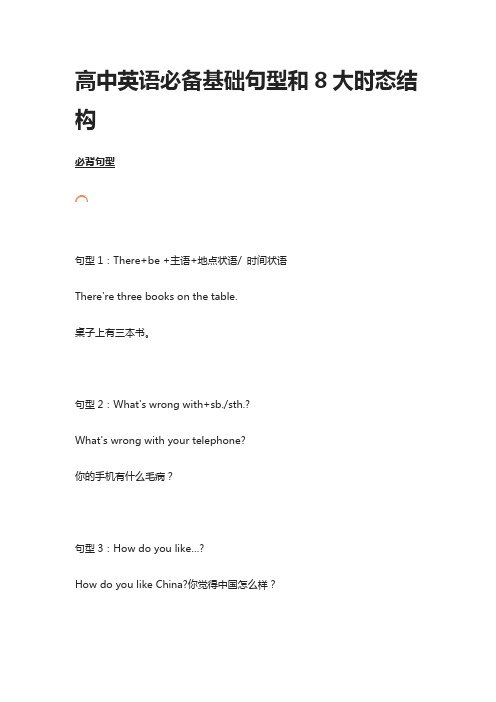
高中英语必备基础句型和8大时态结构必背句型句型1:There+be +主语+地点状语/ 时间状语There're three books on the table.桌子上有三本书。
句型2:What's wrong with+sb./sth.?What's wrong with your telephone?你的手机有什么毛病?句型3:How do you like…?How do you like China?你觉得中国怎么样?句型4:What do you like about…?What do you like about China?你喜欢中国的什么?句型5:had better(not)+动词原形You'd better ask that policeman over there. 你最好去问问那边的那个警察。
句型7:Thank+sb.+for (doing) sth. Thank you for coming to see me.感谢你来看我。
句型8:So+be/情态动词/助动词+主语He is a student. So am I.他是一个学生,我也是。
句型9:not…until…He didn't have supper until his parents came back.直到他的父母回来他才吃饭。
句型10:比较级十and+比较级The baby cried harder and harder.那孩子哭得越来越厉害。
句型11:the+比较级,the+比较级The more one has,the more one wants.拥有的越多,想要的越多。
句型12:…as+adj./adv.+as……not as(so)+adj./adv.+as…Last Sunday the weather was not so wet as it is today. 上个星期天的天气不如今天的天气潮湿。
英语五种基本句型与八大时态
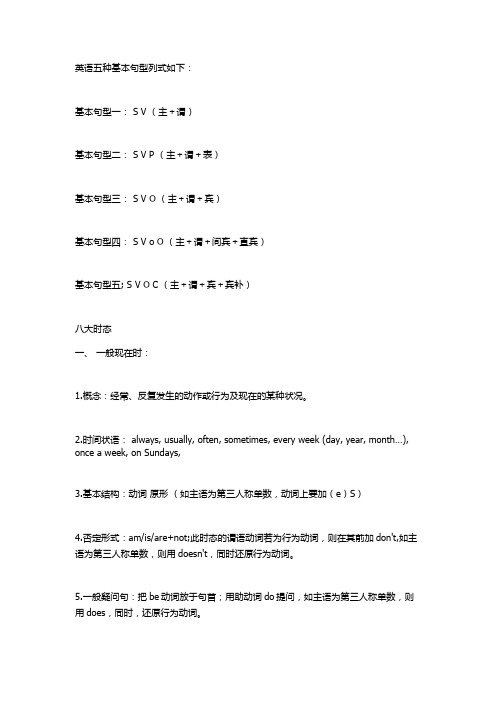
英语五种基本句型列式如下:基本句型一: S V (主+谓)基本句型二: S V P (主+谓+表)基本句型三: S V O (主+谓+宾)基本句型四: S V o O (主+谓+间宾+直宾)基本句型五; S V O C (主+谓+宾+宾补)八大时态一、一般现在时:1.概念:经常、反复发生的动作或行为及现在的某种状况。
2.时间状语: always, usually, often, sometimes, every week (day, year, month…), once a week, on Sundays,3.基本结构:动词原形(如主语为第三人称单数,动词上要加(e)S)4.否定形式:am/is/are+not;此时态的谓语动词若为行为动词,则在其前加don't,如主语为第三人称单数,则用doesn't,同时还原行为动词。
5.一般疑问句:把be动词放于句首;用助动词do提问,如主语为第三人称单数,则用does,同时,还原行为动词。
6.例句:. It seldom snows here.He is always ready to help others.Action speaks louder than words.二、一般过去时:1.概念:过去某个时间里发生的动作或状态;过去习惯性、经常性的动作、行为。
2.时间状语:ago, yesterday, the day before yesterday, last week(year, night, month…), in 1989, just now, at the age of 5, one day, long long ago, once upon a time, etc.3.基本结构:be动词;行为动词4.否定形式:was/were+not;在行为动词前加didn't,同时还原行为动词。
5.一般疑问句:was或were放于句首;用助动词do的过去式did 提问,同时还原行为动词。
时态和语态-基本句型
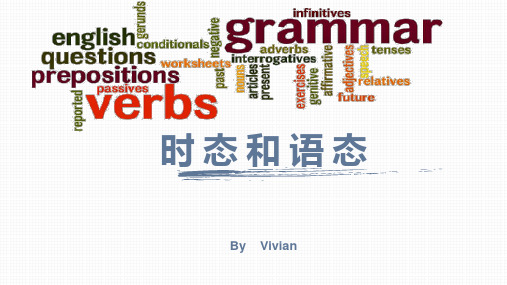
7
基本句型四:S +V +IO +O(主+谓+间宾+直 宾)
S V(及物) IO(多指 人)
O(多指物)
1. She passed him
2. She cooked her
3. She brought me
4. He bought you
5. I showed her
6. I gave
him
7. I told
➢ 基本句型五:S +V +O +C(主+谓+宾+宾补)
➢ 基本句型六:There be 句式
3
基本句型一:S +V (主+谓)
S
1. Time 2. The moon 3. The man 4. An accident 5. Everybody 6. I 7. They 8. He 9.They
Practice
Work on the following sentences and try to anlyze which pattern they belong to. 判断下列句子属于哪种基本 句式
1) Both men speak loudly and clearly.
S+V 主+谓+状
其他关系:wish name make call
基本句型五:S +V +O +C(主+谓+宾+宾补)
S
V(及物) O(宾语)
C(宾补)
1. We 2. They 3. They 4. They 5. What 6. We 7. He 8. I
keep painted call found makes saw asked saw
关于英语句子时态语法

关于英语句子时态语法【篇一】关于英语句子时态语法英语八种时态基本句型一、一般现在时1、肯定句:主语+动词原形(-s,-es)+ 其他。
2、否定句:主语+don’t/doesn’t+动词原形+其他。
3、一般句:Do/Does+主语+动词原形+其他?二、一般过去时1、肯定句:主语+动词-ed+其他。
2、否定句:主语+didn’t+动词原形+其他。
3、一般句:Did+主语+动词原形+其他?三、现在实行时1、肯定句:主语+am/is/are+动词-ing +其他。
2、否定句主语+am/is/are+not+动词-ing+其他。
3、一般句:Am/Is/Are+动词-ing+其他?四、过去实行时1、肯定句:主语+was/were+动词-ing+其他。
2、否定句:主语+was/were+not+动词-ing+其他3、一般句:Was/Were+主语+动词-ing+其他?五、一般将来时1、肯定句:主语+will/shall+动词原形+其他.2、否定句:主语+won’t/shan’t+动词原形+其他.3、一般句:Was/Shall+主语+动词原形+其他?六、过去将来时1、肯定句:主语+would/should+动词原形+其他。
2、否定句:主语+wouldn’t/shouldn’t+动词原形+其他。
3、一般句:Would+主语+动词原形+其他?七、现在完成时1、主语+have/has+过去分词+其他。
2、主语+haven’t/hasn’t+过去分词+其他。
3、 Have/Has+主语+过去分词+其他?八、过去完成时1、肯定句:主语+had+过去分词+其他。
2、否定句:主语+hadn’t+过去分词+其他。
3、一般句:Had+主语+过去分词+其他?【篇二】关于英语句子时态语法1. 一般现在时用法:A) 表示现在发生的动作、情况、状态和特征。
B) 习惯用语。
C) 经常性、习惯性动作。
例:He always helps others. (他总是协助别人。
八种英语时态基本句型
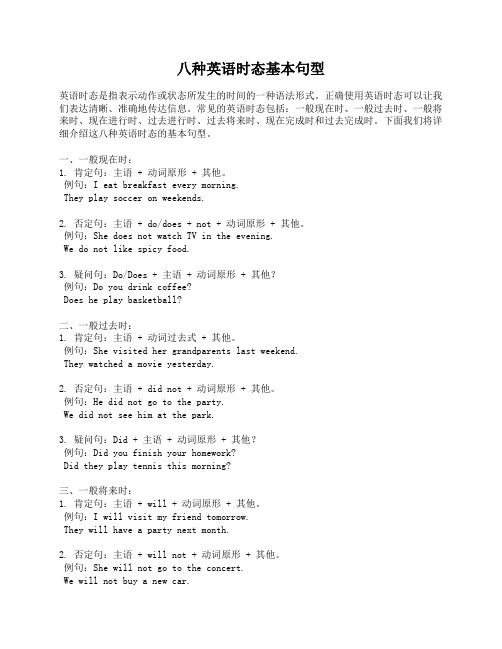
八种英语时态基本句型英语时态是指表示动作或状态所发生的时间的一种语法形式。
正确使用英语时态可以让我们表达清晰、准确地传达信息。
常见的英语时态包括:一般现在时、一般过去时、一般将来时、现在进行时、过去进行时、过去将来时、现在完成时和过去完成时。
下面我们将详细介绍这八种英语时态的基本句型。
一、一般现在时:1. 肯定句:主语 + 动词原形 + 其他。
例句:I eat breakfast every morning.They play soccer on weekends.2. 否定句:主语 + do/does + not + 动词原形 + 其他。
例句:She does not watch TV in the evening.We do not like spicy food.3. 疑问句:Do/Does + 主语 + 动词原形 + 其他?例句:Do you drink coffee?Does he play basketball?二、一般过去时:1. 肯定句:主语 + 动词过去式 + 其他。
例句:She visited her grandparents last weekend.They watched a movie yesterday.2. 否定句:主语 + did not + 动词原形 + 其他。
例句:He did not go to the party.We did not see him at the park.3. 疑问句:Did + 主语 + 动词原形 + 其他?例句:Did you finish your homework?Did they play tennis this morning?三、一般将来时:1. 肯定句:主语 + will + 动词原形 + 其他。
例句:I will visit my friend tomorrow.They will have a party next month.2. 否定句:主语 + will not + 动词原形 + 其他。
英语八种时态定义

英语八种时态定义、结构、用法英语的时态(tense)是一种动词形式,不同的时态用以表示不同的时间与方式。
下面就英语中常见的八种基本时态进行阐述,其它的时态都是在这八种时态的基础上结合而成的。
一、一般现在时:1.概念:经常、反复发生的动作或行为及现在的某种状况。
2.时间状语:always, usually, often, sometimes, every week (day, year, mo nth...), once a week, on Sundays,3.基本结构:动词原形(如主语为第三人称单数,动词上要加(e)S)4.否定形式:am/is/are+not;此时态的谓语动词若为行为动词,则在其前加don’t,如主语为第三人称单数,则用doesn’t,通常还原行为动词。
5.一般疑问句:把be动词放于句首;用助动词do提问,如主语为第三人称单数,则用does,同时,还原行为动词。
6.例句:It seldom snows here.He is always ready to help others.Action speaks louder than words.二、一般过去时:1.概念:过去某个时间里发生的动作或状态;过去习惯性、经常性的动作、行为。
2.时间状语:ago, yesterday, the day before yesterday, last week(year, nig ht, month…), in 1989, just now, at the age of 5, on e day, long long ago, once upon a time, etc.3.基本结构:be动词;行为动词4.否定形式:was/were+not;在行为动词前加didn’t,同时还原行为动词。
5.一般疑问句:was或were放于句首;用助动词do的过去式did 提问,同时还原行为动词。
6.例句:She often came to help us in those days.I didn’t know you were so busy.三、现在进行时:1.概念:表示现阶段或说话时正在进行的动作及行为。
初中英语9大时态+6大词性+3大从句+70个句型
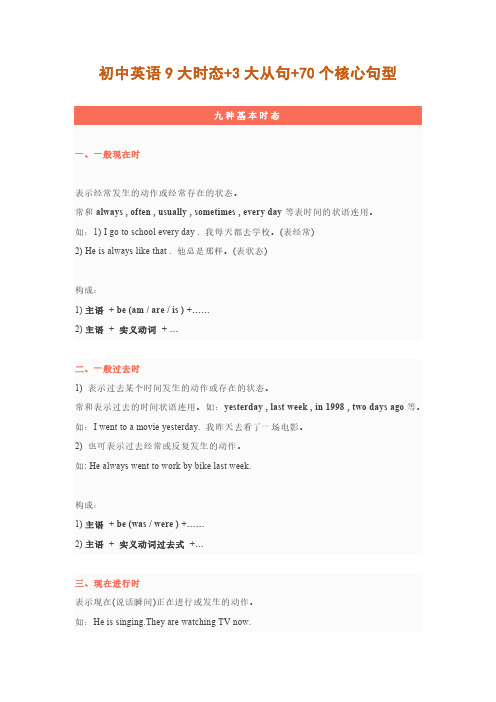
初中英语9大时态+3大从句+70个核心句型九种基本时态一、一般现在时表示经常发生的动作或经常存在的状态。
常和always , often , usually , sometimes , every day等表时间的状语连用。
如:1) I go to school every day . 我每天都去学校。
(表经常)2) He is always like that . 他总是那样。
(表状态)构成:1) 主语+ be (am / are / is ) +……2) 主语+ 实义动词+ …二、一般过去时1) 表示过去某个时间发生的动作或存在的状态。
常和表示过去的时间状语连用。
如:yesterday , last week , in 1998 , two days ago等。
如:I went to a movie yesterday. 我昨天去看了一场电影。
2) 也可表示过去经常或反复发生的动作。
如: He always went to work by bike last week.构成:1) 主语+ be (was / were ) +……2) 主语+ 实义动词过去式+…三、现在进行时表示现在(说话瞬间)正在进行或发生的动作。
如:He is singing.They are watching TV now.构成:主语+ 助动词be(am/are/is) + 动词-ing形式构成四、过去进行时表示过去某一时刻或某一段时间正在进行的动作。
这一特定的过去时间除了有上下文暗示外,一般用时间状语来表示。
如:1) ---What were you doing?---I was jumping.2) ---What was the boy doing when the UFO arrived?---He was sleeping.构成:主语+ 助动词be(was/were) + 动词-ing形式构成.五、一般将来时表示将来某个时间要发生的动作或存在的状态,也表示将来经常或反复发生的动作。
英语八大时态总结表 8种基本时态结构句型
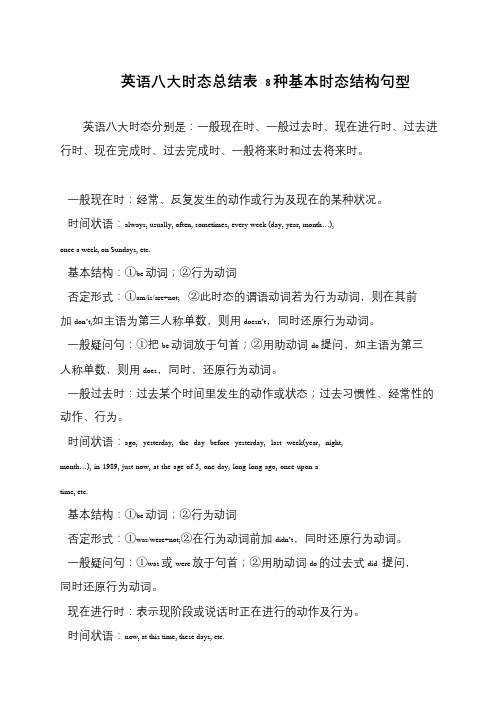
英语八大时态总结表8 种基本时态结构句型英语八大时态分别是:一般现在时、一般过去时、现在进行时、过去进行时、现在完成时、过去完成时、一般将来时和过去将来时。
一般现在时:经常、反复发生的动作或行为及现在的某种状况。
时间状语:always, usually, often, sometimes, every week (day, year, month…),once a week, on Sundays, etc.基本结构:①be 动词;②行为动词否定形式:①am/is/are+not; ②此时态的谓语动词若为行为动词,则在其前加don’t,如主语为第三人称单数,则用doesn’t,同时还原行为动词。
一般疑问句:①把be 动词放于句首;②用助动词do 提问,如主语为第三人称单数,则用does,同时,还原行为动词。
一般过去时:过去某个时间里发生的动作或状态;过去习惯性、经常性的动作、行为。
时间状语:ago, yesterday, the day before yesterday, last week(year, night,month…), in 1989, just now, at the age of 5, one day, long long ago, once upon atime, etc.基本结构:①be 动词;②行为动词否定形式:①was/were+not;②在行为动词前加didn’t,同时还原行为动词。
一般疑问句:①was 或were 放于句首;②用助动词do 的过去式did 提问,同时还原行为动词。
现在进行时:表示现阶段或说话时正在进行的动作及行为。
时间状语:now, at this time, these days, etc.。
英语的各种时态句型
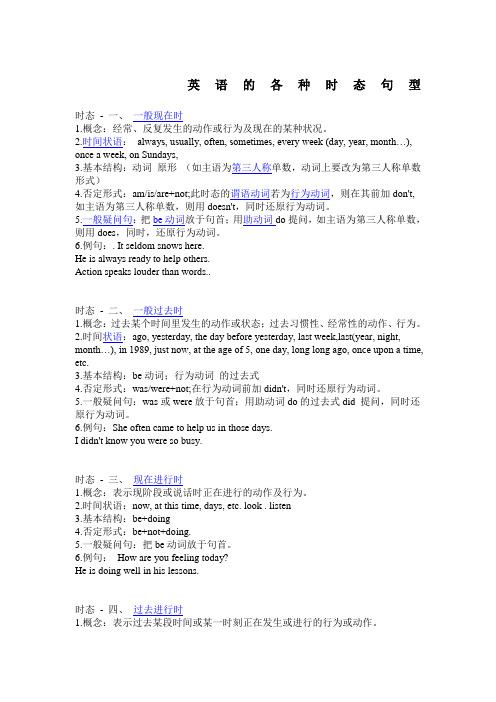
英语的各种时态句型时态- 一、一般现在时1.概念:经常、反复发生的动作或行为及现在的某种状况。
2.时间状语:always, usually, often, sometimes, every week (day, year, month…), once a week, on Sundays,3.基本结构:动词原形(如主语为第三人称单数,动词上要改为第三人称单数形式)4.否定形式:am/is/are+not;此时态的谓语动词若为行为动词,则在其前加don't,如主语为第三人称单数,则用doesn't,同时还原行为动词。
5.一般疑问句:把be动词放于句首;用助动词do提问,如主语为第三人称单数,则用does,同时,还原行为动词。
6.例句:. It seldom snows here.He is always ready to help others.Action speaks louder than words..时态- 二、一般过去时1.概念:过去某个时间里发生的动作或状态;过去习惯性、经常性的动作、行为。
2.时间状语:ago, yesterday, the day before yesterday, last week,last(year, night, month…), in 1989, just now, at the age of 5, one day, long long ago, once upon a time, etc.3.基本结构:be动词;行为动词的过去式4.否定形式:was/were+not;在行为动词前加didn't,同时还原行为动词。
5.一般疑问句:was或were放于句首;用助动词do的过去式did 提问,同时还原行为动词。
6.例句:She often came to help us in those days.I didn't know you were so busy.时态- 三、现在进行时1.概念:表示现阶段或说话时正在进行的动作及行为。
英语时态8种基本时态讲解
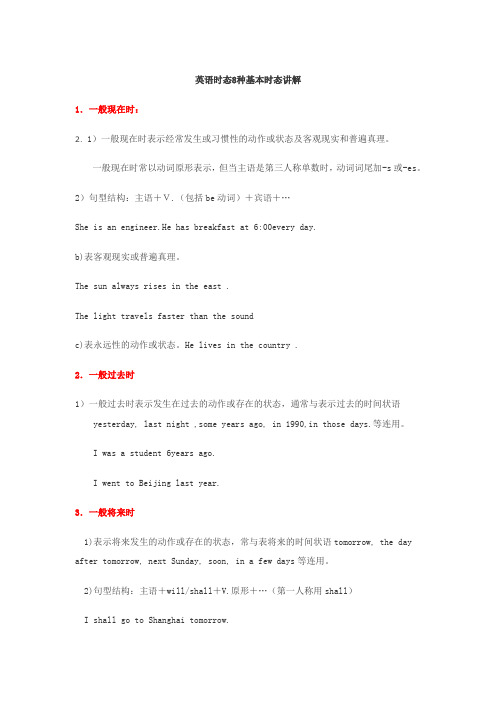
英语时态8种基本时态讲解1.一般现在时:2.1)一般现在时表示经常发生或习惯性的动作或状态及客观现实和普遍真理。
一般现在时常以动词原形表示,但当主语是第三人称单数时,动词词尾加-s或-es。
2)句型结构:主语+V.(包括be动词)+宾语+…She is an engineer.He has breakfast at 6:00every day.b)表客观现实或普遍真理。
The sun always rises in the east .The light travels faster than the soundc)表永远性的动作或状态。
He lives in the country .2.一般过去时1)一般过去时表示发生在过去的动作或存在的状态,通常与表示过去的时间状语yesterday, last night ,some years ago, in 1990,in those days.等连用。
I was a student 6years ago.I went to Beijing last year.3.一般将来时1)表示将来发生的动作或存在的状态,常与表将来的时间状语tomorrow, the day after tomorrow, next Sunday, soon, in a few days等连用。
2)句型结构:主语+will/shall+V.原形+…(第一人称用shall)I shall go to Shanghai tomorrow.They will have a meeting next week..3)主语+will/shall+V.原形+…be(am, is, are)going toThey will have a meeting next Sunday.(will=are going to )4) be about to+V.原形I am about to leave school.4.过去将来时1)过去将来时是立足于过去某时,从过去的观点看将要发生的动作或状态。
英语时态8种基本时态讲解

英语时态8种基本时态讲解一.概念:英语中表示不同时间发生的动作或存在的状态,需用不同的动词形式表示,这种不同的动词形式称为时态。
二.种类:(基本时态)一般现在时一般过去时现在进行时过去进行时一般将来时过去将来时现在完成时过去完成时三.用法:1)一般现在时表示经常发生或习惯性的动作或状态及客观现实和普遍真理。
一般现在时常以动词原形表示,但当主语是第三人称单数时,动词词尾加-s或-es。
2)句型结构:主语+V.(包括be动词)+宾语+…She is an engineer.He has breakfast at 6:00every day.3)注意:a)一般现在时通常与always , often , usually , every day , sometimes , once aweek 等时间状语连用。
I always watch TV at 8:00 in the evening .They go home once a week .We usually do our homework at home .b)表客观现实或普遍真理。
The sun always rises in the east .The light travels faster than the sound .c)表永远性的动作或状态。
He lives in the country .例句:我们每天晚上九点做作业。
我在早上七点半起床。
他每天七点去上班。
我们经常下午打篮球。
他喜欢音乐。
地球围绕太阳转。
火车六点出发。
1)一般过去时表示发生在过去的动作或存在的状态,通常与表示过去的时间状语yesterday, last night ,some years ago, in 1990,in those days.等连用。
I was a student 6years ago.I went to Beijing last year.They saw a film last night .2)句型结构:主语+V.过去时+宾语+…例句:昨天他很忙。
初中英语八种时态基本句型

初中英语八种时态基本句型一、一般现在时1、肯定句:主语+动词原形(-s,-es)+ 其他。
2、否定句:主语+don’t/doesn’t+动词原形+其他。
3、疑问句:Do/Does+主语+动词原形+其他?二、一般过去时1、肯定句:主语+动词-ed+其他。
2、否定句:主语+didn’t+动词原形+其他。
3、疑问句:Did+主语+动词原形+其他?三、现在进行时1、肯定句:主语+am/is/are+动词-ing +其他。
2、否定句主语+am/is/are+not+动词-ing+其他。
3、疑问句:Am/Is/Are+动词-ing+其他?四、过去进行时1、肯定句:主语+was/were+动词-ing+其他。
2、否定句:主语+was/were+not+动词-ing+其他3、疑问句:Was/Were+主语+动词-ing+其他?五、一般将来时1、肯定句:主语+will/shall(be going to)+动词原形+其他.2、否定句:主语+won’t/shan’t+动词原形+其他.3、疑问句:Was/Shall+主语+动词原形+其他?六、过去将来时1、肯定句:主语+would/should+动词原形+其他。
2、否定句:主语+wouldn’t/shouldn’t+动词原形+其他。
3、疑问句:Would+主语+动词原形+其他?七、现在完成时1、肯定句:主语+have/has+过去分词+其他。
2、否定句:主语+haven’t/hasn’t+过去分词+其他。
3、疑问句:Have/Has+主语+过去分词+其他?八、过去完成时1、肯定句:主语+had+过去分词+其他。
2、否定句:主语+hadn’t+过去分词+其他。
3、疑问句::Had+主语+过去分词+其他?。
英语八种时态基本句型结构

英语⼋种时态基本句型结构“主语 + 谓语”(即“主谓”句型):这⼀句型英汉语⾔结构形式完全相同,说明“某⼈或某物如何动作”,或者说“某⼈或某物⾃⾝怎样运动”。
例:They arrived in Harbin yesterday morning.扩展资料 “主语 + 谓语 + 宾语”(即“主谓宾”句型): 这⼀句型英汉语⾔的结构形式完全相同,⽤以说明“某⼈或某物做什么事情”,或者说“某⼈或某物发出了动作,并且其动作涉及到另⼀个⼈或物”。
例:I study English. “主语 + 谓语 + 间接宾语 + 直接宾语”(即“主谓双宾”句型): 这⼀句型英汉语序结构相同,说明“某⼈为谁(间接宾语为⼈)做某事”,或者说“某⼈或物的.运动涉及到两个对象,其中⼀个间接对象为⼈,另⼀个为物”。
例:Our teacher taught us English. “主语 + 谓语 + 宾语 + 宾语补⾜语”(即“主谓宾补”句型): 这⼀句型说明“某⼈或某物要求(使、让)某⼈做什么”或“某⼈感觉某⼈或物怎么样”。
例: He asked her to go there. “主语 + 系动词+ 表语”(即“主系表”句型): 这⼀句型⽤以说明“某⼈(某物、某事、某种概念)具有什么特征或处于什么状态”。
汉语的“是”字结构属于这⼀英语句型的形式之⼀。
常⽤的联系动词有be, keep,lie, remain, stand, become, fall, get, go, grow, turn, look, feel, seem, smell, sound, taste, 等。
例: I am a teacher. 我是⼀名⽼师。
“There + be + 主语+ …”(即“存在”句型): 这⼀句型⽤以说明“在某地或某时存在某⼈或某物”。
例:There is a bird in the tree. 在树上有⼀只鸟。
⽐较句型: 这⼀句型⽤以⽐较物质甲与⼄之间的异同。
英语五种基本句型与八大时态

英语五种基本句型列式如下:基本句型一: S V (主+谓)基本句型二: S V P (主+谓+表)基本句型三: S V O (主+谓+宾)基本句型四: S V o O (主+谓+间宾+直宾)基本句型五; S V O C (主+谓+宾+宾补)八大时态一、一般现在时:1.概念:经常、反复发生的动作或行为及现在的某种状况。
2.时间状语: always, usually, often, sometimes, every week (day, year, month…), once a week, on Sundays,3.基本结构:动词原形(如主语为第三人称单数,动词上要加(e)S)4.否定形式:am/is/are+not;此时态的谓语动词若为行为动词,则在其前加don't,如主语为第三人称单数,则用doesn't,同时还原行为动词。
5.一般疑问句:把be动词放于句首;用助动词do提问,如主语为第三人称单数,则用does,同时,还原行为动词。
6.例句:. It seldom snows here.He is always ready to help others.Action speaks louder than words.二、一般过去时:1.概念:过去某个时间里发生的动作或状态;过去习惯性、经常性的动作、行为。
2.时间状语:ago, yesterday, the day before yesterday, last week(year, night, month…), in 1989, just now, at the age of 5, one day, long long ago, once upon a time, etc.3.基本结构:be动词;行为动词4.否定形式:was/were+not;在行为动词前加didn't,同时还原行为动词。
5.一般疑问句:was或were放于句首;用助动词do的过去式did 提问,同时还原行为动词。
英语各种时态的概念和句型结构

英语各种时态的概念和句型结构一、一般现在时1、概念:表示经常性、习惯性的动作。
2、句型结构(1)be(am,is,are)动词陈述肯定句:主语+be(am,is,are)+其它。
陈述否定句:主语+be(am,is,are)+not+其它。
一般疑问句:Be(am,is,are)+主语+其它特殊疑问句:疑问词+一般疑问句Who are they反意疑问句:肯定陈述句+be(am,is,are)+not+主语(相应的代词)Tom is a doctor, isn’t he否定陈述句,+be(am,is,are)+主语(相应的代词)Tom isn’t a doctor , is he(2)实义动词陈述肯定句:其他人称:主语+v.原形+其它。
We go to the beach every Sunday.第三人称单数:主语++其它。
Sally does her homework every day.陈述否定句:其他人称:主语+don’t+v.原形+其它。
We don’t go to the beach every Sunday.第三人称单数:主语+doesn’t+v.原形+其它。
Sally doesn’t do her homework every day.一般疑问句:其他人称:Do+主语+v.原形+其它Do we go to the beach every Sunday第三人称单数:Does+主语+v.原形+其它Does Sally do her homework every day特殊疑问句:疑问词+一般疑问句其他人称:Where do you go every Sunday第三人称单数:What does Sally do every day反意疑问句:肯定陈述句,+don’t/doesn’t+主语(相应的代词)其他人称:We go to the beach every Sunday, don’t we第三人称单数:Sally does her homework every day, doesn’t she否定陈述句,+do/does+主语(相应的代词)其他人称:We don’t go to the beach every Sunday , do we第三人称单数:Sally doesn’t do her homework every day , does she二、一般过去时1、概念:表示过去某个时间发生的动作或存在的状态。
英语八大时态基本句型及例句

英语八大时态基本句型及例句英语中有八种基本时态,包括:现在简单时态、现在进行时态、现在完成时态、过去简单时态、过去进行时态、过去完成时态、将来简单时态和将来完成时态。
以下是每种时态的基本句型及例句:1. 现在简单时态(Present Simple Tense)基本句型:主语 + 动词原形(第三人称单数加s)例句:My sister reads books every day.(我姐姐每天都读书。
) 2. 现在进行时态(Present Continuous Tense)基本句型:主语 + am/is/are + 现在分词例句:I am studying English now.(我正在学英语。
)3. 现在完成时态(Present Perfect Tense)基本句型:主语 + have/has + 过去分词例句:She has visited many countries.(她去过很多国家。
) 4. 过去简单时态(Past Simple Tense)基本句型:主语 + 过去式动词例句:He went to the beach last weekend.(上周末他去了海滩。
)5. 过去进行时态(Past Continuous Tense)基本句型:主语 + was/were + 现在分词例句:They were playing basketball when it started to rain.(当下雨时他们正在打篮球。
)6. 过去完成时态(Past Perfect Tense)基本句型:主语 + had + 过去分词例句:I had finished my homework before my friends arrived.(朋友到达之前我已经完成了作业。
)7. 将来简单时态(Future Simple Tense)基本句型:主语 + will + 动词原形例句:I will help you with your project tomorrow.(我明天会帮你做项目。
英语各时态的标志词和句型

英语时态是英语语法中的重要部分,下面是英语各时态的标志词和句型介绍:1. 现在时态:现在时态通常表示当前发生的事情,标志词有now, today, always, frequently等。
句型为:主语+动词+其他成分(如宾语、状语等)。
例如:I eat apples every day.2. 过去时态:过去时态表示过去发生的事情,标志词有yesterday, last night, once upon a time等。
句型为:主语+动词的过去式+其他成分。
例如:I played football yesterday.3. 将来时态:将来时态表示将来发生的事情,标志词有will, tomorrow, next week等。
句型为:主语+will+动词原形+其他成分。
例如:It will rain tomorrow.4. 进行时态:进行时态表示正在进行的事情,标志词有be动词和动词ing 形式。
句型为:主语+be动词+动词ing形式+其他成分。
例如:She is singing a song now.5. 完成时态:完成时态表示已经完成的事情,标志词有have, had等。
句型为:主语+have/has+动词过去分词+其他成分。
例如:I have finished my homework.6. 完成进行时态:完成进行时态表示某个动作已经完成,并且这个动作是在过去一段时间内持续进行的。
标志词有have been, had been 等。
句型为:主语+have/has been+动词的现在分词+其他成分。
例如:I have been studying English for two years.7. 过去进行时态:过去进行时态表示在过去某个时间点正在进行的事情,标志词有was, were等。
句型为:主语+was/were+动词ing形式+其他成分。
例如:I was watching TV at 8:00 yesterday evening.8. 过去完成时态:过去完成时态表示在过去某个时间点之前已经完成的事情,标志词有had, had been等。
- 1、下载文档前请自行甄别文档内容的完整性,平台不提供额外的编辑、内容补充、找答案等附加服务。
- 2、"仅部分预览"的文档,不可在线预览部分如存在完整性等问题,可反馈申请退款(可完整预览的文档不适用该条件!)。
- 3、如文档侵犯您的权益,请联系客服反馈,我们会尽快为您处理(人工客服工作时间:9:00-18:30)。
英语的基本时态和基本句型这篇文章是给只蹦词不成句的人的,包括时态,基本句型两部分。
基本时态部分一般时态、进行时态、完成时态一般时态:一般现在时态:表示经常或习惯动作,现在的状态或者普遍真理。
一般过去时态:过去发生的动作或情况。
一般将来时态:将要发生的动作或情况。
进行时态:现在进行时态:现在这段或这点正在发生的。
过去进行时态:过去某段或某点正在发生的。
将来进行时态:将来某段或某点正在发生的。
完成时态:现在完成时态:现刻以前发生的动作或情况。
和现在有密切的联系,可从时间上或从后果上和现在联系起来1.到现在为止的这一时期中发生的情况(可能是多次动作的总和,也可表示状态和习惯性动作)2. 对现状有影响的某一已发生的动作过去完成时态:截止到过去某一时间所完成的动作或情况将来完成时态:截止到将来某一时间所完成的动作或情况一般现在时doI go to shopping every day.一般过去时didI went to shopping yesterday.一般将来时will do /be going to doI will go shopping tomorrow. / I am going shopping tomorrow.现在进行时be doinghe is playing basketball.过去进行时was/were doingHe was playing basketball at 7:00 yesterday.将来进行时will be doingHe will be playing basketball tomorrow afternoon.现在完成时have doneI have finished my homework.过去完成时had doneI had finished my homework by yesterday.将来完成时will have doneI will have finished my homework when you come back tomorrow.补充例句:一般现在时1) They go to work by bike every day.2) Does the moon move around the sun? Y es, it does.3) He doesn't love sports.4) We are all teachers from the country.5) The children don’t have enough food in Africa.6) Do you go to see your uncle every other day?一般过去时1)My mother wasn't in last night.2)We didn't watch TV last night.3)The girl cried just now.4)We were middle school students last year.5)Were you at home last night? Y es, I were.6)Did you wash clothes last night? No, I didn't.一般将来时1)When will you be able to visit us again?2)I won't be free tonight.3)My sister will finish her middle school this year.现在进行时1)They are showing us around the farm.2)Are the students reading now?3)It isn't raining hard.4)We are leaving on Friday.过去进行时1)I was reading at night yesterday morning.2)We weren't planting trees this time yesterday.3)Were they singing when the teacher came? Y es, they were.将来进行时1)What will they be doing tomorrow evening?2)It won't be long before we will be making such a good train.3)I won't be leaving until 12.现在完成时1)How many words have you learnt today?2)He hasn't got up yet.3)I have been to England.过去完成时1)He said he hadn't collected 300 stamps.2)Had you learnt 280 new words by the end of last month ?3)When I rushed to the cinema, the film had begun.将来完成时1)We will have finished our middle school next July.2)Will he have finished writing the novel by the end of next month? Y es, he will.3)We won't have finished the job when you turn back.基本句型部分学句子要先弄清楚句子的成分:1)句子成分:主语、谓语、表语、宾语、定语、状语、补足语和同位语。
主语:句子所叙述的主体,一般位于句首。
School is over at six. 六点钟放学。
The rich should help the poor.夫人应该帮助穷人。
谓语:说明主语所做的动作或具有的特征和状态。
动词在句中作谓语,一般放在主语之后。
He went to the supermarket yesterday.He is in the room.She has a straight hair.表语:用以说明主语的身份、特征和状态,它一般位于系动词(如be, become, get, look, grow, turn, seem等)之后。
The class is over.It looks nice.The flower grows well.The weather has turned cold.The speech is exciting.宾语:表示动作的对象或承爱者,一般位于及物动词和介词后面They went to see a movie yesterday.I like to listen to popular music.宾语补足语:有些及物动词,除有一个直接宾语以外,还要有一个宾语补语,才能使句子的意义完整。
His father named him Dongming.(名词)They painted their boat white.(形容词)定语:修饰名词或代词的词、短语或从句。
Guilin is a beautiful city.(形容词)状语:修饰动词、形容词、副词或整个句子,说明动作或状态特征。
Light travels most quickly.(副词及副词性词组)He has lived in the city for ten years.(介词短语)状语种类如下:How about meeting again at six?(时间状语)Last night she didn’t go to the dance party because of the rain.(原因状语)I shall go there if it doesn’t rain.(条件状语)Mr. Smith lives on the third floor.(地点状语)She put the eggs into the basket with great are.(方式状语)She came in with a dictionary in her hand.(伴随状语)In order to catch up with the others, I must work harder.(目的状语)He was so tired that he fell asleep immediately.(结果状语)She works very hard though she is old.(让步状语)I am taller than he is.(比较状语)2)基本句型:简单句,并列句,复合句:简单句:只有一个主语和一个谓语句子。
并列句:由并列连词或分号把两个或两个以上的简单句连在一起的句子。
复合句:含有一个或一个以上从句的句子。
复合句包含:A.名词性从句(主语从句、宾语从句、表语从句和同位语从句)B.定语从句C.状语从句(1)简单句主- 系- 表;主- 谓- 宾(2)并列句句1 + 连词+ 句2(3)复合句主句+连词+从句;连词+从句,主句简单句的五种基本句型1、主语+系动词+表语:e.g. He is a student.2、主语+不及物动词:e.g. We work.3、主语+及物动词+宾语:e.g. Henry bought a dictionary.4、主语+及物动词+双宾语(间接宾语+直接宾语):e.g. My father bought me a car.5、主语+及物动词+复合宾语(宾语+宾补):e.g. Tom made the baby laugh.并列句的类型1、表示连接两个同等概念:常用and, not only…but also…, neither…nor…, then等连接。
e.g. The teacher’s name is Smith, and the student’s name is John.2、表示选择:常用的连词有or, either…or…, otherwise等。
e.g. Hurry up, or you’ll miss the train.3、表示转折:常用的连词有but, still, however, yet, while, when等。
e.g. He was a little man with thick glasses, but he had a strange way of making his classes lively and interesting.4、表示因果关系:常用的连词有so, for, therefore等。
